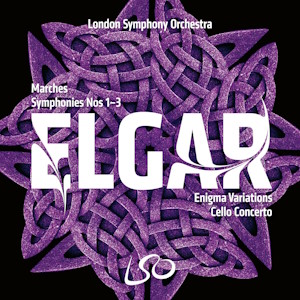
Sir Edward Elgar (1857-1934)
Symphony No. 1 in A-flat major, Op. 55 (1907-8)
Symphony No. 2 in E-flat major, Op.63 (1911)
Symphony No. 3 in C minor, Op 88 (posth.) (1932-34 – sketches elaborated by Anthony Payne)
Variations on an original theme (‘Enigma’), Op. 36 (1888-89)
Introduction and Allegro for Strings, Op. 47 (1905)
Cello Concerto in E minor, Op. 85 (1918-19)
Pomp and Circumstance Military Marches, Op 39 (1901-07; 1930)
Imperial March, Op. 32 (1897)
Coronation March, Op. 65 (1911)
Ralph Vaughan Williams (1872-1958)
Fantasia on a Theme by Thomas Tallis (1910)
rec. 1988-2020, Barbican & Walthamstow Town Hall, London
LSO Live LSO0572 [4 CDs: 305]
This collection celebrates the LSO’s long association with Elgar and consists of previously released but newly remastered recordings, plus a new first release on CD of a recording of Vaughan Williams’ Fantasia, a work which was premiered by the LSO under the composer’s direction back in 1910.
However, William Hedley’s detailed review of the three symphonies back in 2002 makes very interesting reading. He makes no bones about being disappointed in these performances, finding them slow, ponderous, over-interventionist and self-conscious. He also complains of two flaws, both frequently associated with the conductor as he advanced in age and with the recording venue: Davis’ constant, audible and intrusive vocalisation and the “dry, close” recorded sound of the Barbican. I refer you to that review for his expansion on these points, as I completely concur and any reiteration of them by me would be redundant. There is some beautiful playing here and the LSO clearly does what their conductor wants them to do – more’s the pity. The strange thing is that Davis’ live recordings of the First Symphony made in 1985 with the BBC SO and in 1998 in Dresden are both far superior, yet just a few years later he had rethought his approach to no good purpose. My preferences for recordings of the first two symphonies remain with Barbirolli (with the Philharmonia and the Hallé respectively), Handley with the LPO and, above all, Elder with the Hallé again. For more of an outlier, there is Sinopoli with the Philharmonia, who is also somewhat wayward and daringly expansive but achieves a much more cohesive result than Davis, despite his etiolated tempi. For Payne’s completion of the Third Symphony, there are fine recordings from Andrew Davis and the BBC SO, Paul Daniel with the Bournemouth SO and – surprisingly – Tadaaki Otaka in Sapporo, on Signum Classics.
John Quinn was able to write more positively about Davis’ performances of the Enigma Variations and the Introduction and Allegro for Strings as included in the 2019 13 CD set titled the Sir Colin Davis Anthology (review), but they are by no means the best on record and nobody is going to buy this set if its core works – the three symphonies – are substandard in execution and sound. To my ears, the Introduction and Allegro is in any case…just OK, but without the bite and snap of my favourite versions such as Barbirolli’s famous account with the Allegri String Quartet – in fact, I find it rather flaccid, and once again Colin’s vocalise is distracting. The sound for the Enigma Variations is so distant and thin that it cannot compete with far more venerable accounts such as Mehta with the Los Angeles Philharmonic in 1972 or Monteux with the LSO in 1970. Much more satisfying – and in better sound – is de Burgos’ and Schmidt’s rich and Romantic playing of the Cello Concerto, although many others, such as those by Jacqueline du Pré and Barbirolli or – more controversially – Alisa Weilerstein with Barenboim, have even greater claims to be considered.
The marches are played con gusto and great fun but surely nobody is going to buy this set primarily for those. They are often offered as fillers and bonuses in many of the classic recordings I cite above; for example, the vintage 1959 stereo recordings of the five Pomp and Circumstance marches by Sir Arthur Bliss and the LSO were included on both the old “Weekend Classics” and “Headline Classics” issues on the Decca label of Enigma Variations by Monteux and Mehta respectively, mentioned above as better options.
The inclusion of the Vaughan Williams recording seems a little random in context, but let us just consider it as a welcome bonus. It is exquisitely played, but once again the Barbican’s dry acoustic robs it of the kind of sonic halo we hear in Barbirolli’s 1962 recording made in Temple Church. His cellos are much warmer and somehow Barbirolli finds so much more surging passion and even heartbreak in those yearning chords and shimmering arpeggios.
A hundred-page booklet provides programme notes in English, French and German for every work, biographies and historic photographs – but in truth, this set is a non-starter.
Ralph Moore
Help us financially by purchasing from


Recording details
Felix Schmidt (cello)
London Symphony Orchestra/Sir Colin Davis, Barry Tuckwell (marches), Rafael Frühbeck de Burgos (cello concerto), Sir Antonio Pappano (Fantasia)
rec. live 30 September & 1 October (Op. 55); 4 & 5 October (Op. 63); 14 & 15 December (Op. 88), 2001; 23 September & 9 December 2005 (Op. 47); 6 & & January 2007 (Op. 36); 15 March 2020 (Fantasia), Barbican Hall, London; 26 & 27 April (Opp. 39, 32 & 65); 28 & 29 September (Op. 85) 1988, Walthamstow Town Hall, London

















